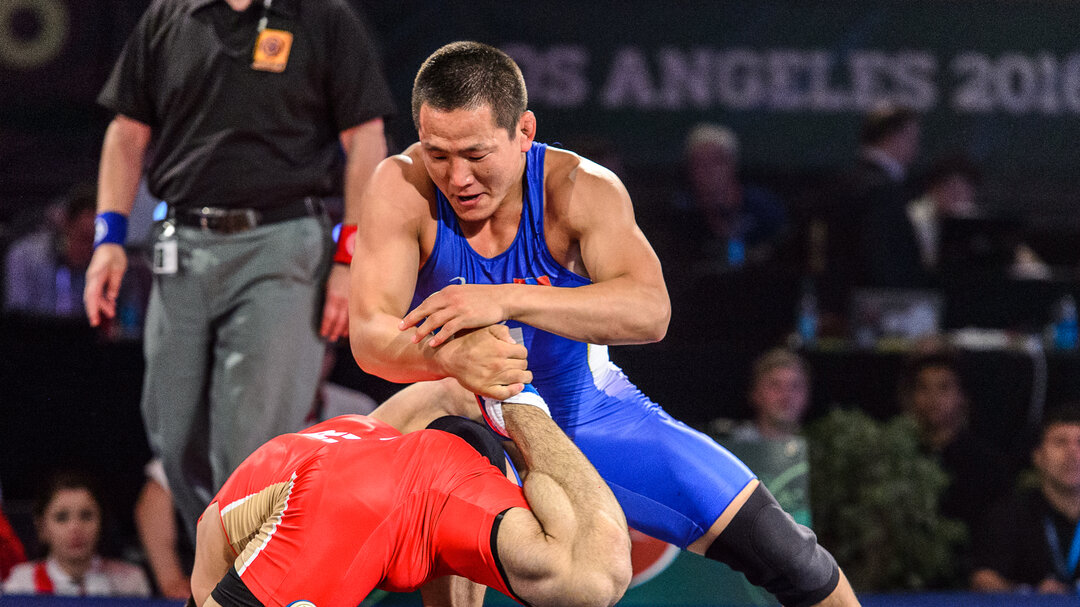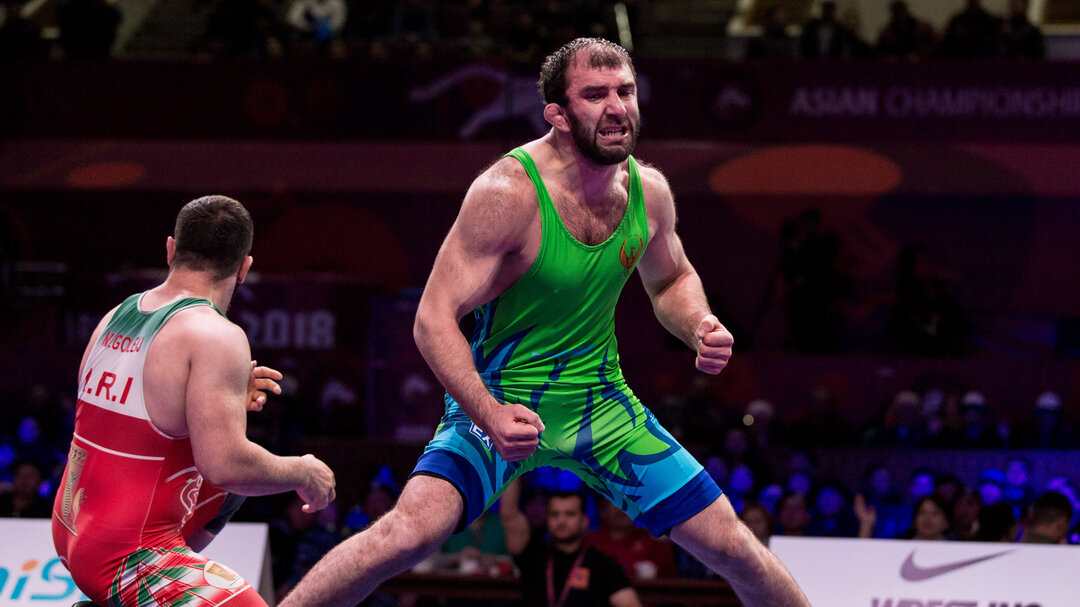Yazdani Charati Takes Over Top Ranking in Freestyle
Thursday, March 8, 2018 - 14:36 By United World Wrestling Press

CORSIER-SUR-VEVEY (March 8) -- Olympic champion Hassan YAZDANI CHARATI (IRI), fresh off winning a gold medal at the Asian Championships in Bishkek, takes over the No.1 ranking at 86kg in freestyle.

Mongolia has four No.1-ranked wrestlers in freestyle, which is more than any other nation. Top-ranked Mongolians in freestyle include Tsogbadrakh TSEVEENSUREN (57kg), Mandakhnaran GANZORIG (74kg), Turtogtokh LUVSANDORJ (92kg) and Zolboo NATSAGSUREN (125kg).
Other top-ranked wrestlers in freestyle include Abbos RAKHMONOV (UZB) at 61kg, Daulet NIYAZBEKOV (KAZ) at 65kg, Ogbonna JOHN (NGR) at 70kg, Rashid KURBANOV (UZB) at 79kg and Magomed IBRAGIMOV (UZB).
Winners of the Ranking Series events each received 8 points, plus an additional point for ever entry in their bracket. Placement points (plus number entries) were also awarded to the rest of the top five finishers: runner-up (6), bronze (4) and fifth place (2).
Points will be automatically uploaded on the UWW homepage following the conclusion of all Ranking Series events, continental and world championships.
In case of a points tie between two or more athletes, the following will determine the highest ranked individual:
- Highest number of participation in the ranking events*
- Highest number of Gold Medals in the ranking events*
- Highest number of Silver Medals in the ranking events*
- Highest number of Bronze Medals in the ranking events*
- The most classification points in the ranking events*
- The most match won by superiority in the ranking events*
- The most technical points scored in the ranking events*
* Continental Championship and UWW Select Ranking Events of the concerned year.
Should top seeded athletes not participate in the Senior World Championships or Olympic Games the same criteria will be applied to determine which athletes move into the seeding for the event. df. Mohammadshafie GOLEIJ (IRI) -by VPO1, 5 - 3-4.jpg)
57kg
1. Tsogbadrakh TSEVEENSUREN (MGL) // 32 Points
2. Kumsong KANG (PRK) // 26 Points
3. Makhmudjon SHAVKATOV (UZB) // 24 Points
4. Zhandos ISMAILOV (KAZ) // 22 Points
5. Toshihiro HASEGAWA (JPN) // 22 Points
61kg
1. Abbos RAKHMONOV (UZB) // 32 Points
2. Nurislam (Artas) // SANAYEV (SANAA) // (KAZ) // 24 Points
3. Kazuya KOYANAGI (JPN) // 22 Points
4. Ulukbek ZHOLDOSHBEKOV (KGZ) // 20 Points
5. Adama DIATTA (SEN) // 19 Points
65kg
1. Daulet NIYAZBEKOV (KAZ) // 26 Points
2. Daichi TAKATANI (JPN) // 24 Points
3. Temurjon USMONOHUNOV (UZB) // 22 Points
4. Bajrang BAJRANG (IND) // 22 Points
5. Amas DANIEL (NGR) // 21 Points
70kg
1. Ogbonna Emmanuel JOHN (NGR) // 24 Points
2. Ikhtiyor NAVRUZOV (UZB) // 24 Points
3. Amr Reda Ramadan HUSSEN (EGY) // 22 Points
4. Seungbong LEE (KOR) // 22 Points
5. Chems Eddine BOUCHAIB (ALG) // 20 Points
74kg
1. Mandakhnaran GANZORIG (MGL) // 32 Points
2. Dovletmyrat ORAZGYLYJOV (TKM) // 30 Points
3. Muslim EVLOEV (KGZ) // 24 Points
4. Mostafa Mohabbali HOSSEINKHANI (IRI) // 20 Points
5. Daniyar KAISANOV (KAZ) // 20 Points
79kg
1. Rashid KURBANOV (UZB) // 31 Points
2. Ezzatollah Abbas AKBARIZARINKOLAEI (IRI) // 24 Points
3. Ekerekeme AGIOMOR (NGR) // 20 Points
4. Tsubasa ASAI (JPN) // 20 Points
5. Turbold GANBOLD (MGL) // 20 Points
86kg
1. Hassan Aliazam YAZDANICHARATI (IRI) // 24 Points
2. Melvin BIBO (NGR) // 23 Points
3. Uitumen ORGODOL (MGL) // 22 Points
4. Hein Jakobus JANSE VAN RENSBURG (RSA) // 21 Points
5. David TAYLOR III (USA) // 20 Points
92kg
1. Turtogtokh LUVSANDORJ (MGL) // 27 Points
2. Mohammadjavad Mohammadebrahim EBRAHIMIZIVLAEI (IRI) // 22 Points
3. Adilet DAVLUMBAYEV (KAZ) // 20 Points
4. Hosam Mohamed Mostafa MERGHANY (EGY) // 18 Points
5. Azizbek SOLIEV (UZB) // 18 Points
97kg
1. Magomed IBRAGIMOV (UZB) // 36 Points
2. Mojtaba Mohammadshafie GOLEIJ (IRI) // 21 Points
3. Takeshi YAMAGUCHI (JPN) // 19 Points
4. Jaegang KIM (KOR) // 19 Points
5. Martin ERASMUS (RSA) // 18 Points
125kg
1. Zolboo NATSAGSUREN (MGL) // 35 Points
2. Davit MODZMANASHVILI (UZB) // 25 Points
3. Giorgi SAKANDELIDZE (QAT) // 23 Points
4. Amin Hossein TAHERI (IRI) // 21 Points
5. Khaled Omr Zaki Mohamed ABDALLA (EGY) // 19 Points


 Women's Wrestling at the 2004 Athens Olympic Games. (Photo: United World Wrestling / Martin Gabor)
Women's Wrestling at the 2004 Athens Olympic Games. (Photo: United World Wrestling / Martin Gabor) Tayla FORD (NZL) is the first wrestler from New Zealand who will compete at the Olympics. (Photo: United World Wrestling / Amirreza Aliasgari)
Tayla FORD (NZL) is the first wrestler from New Zealand who will compete at the Olympics. (Photo: United World Wrestling / Amirreza Aliasgari)
Share your thoughts.
Comments